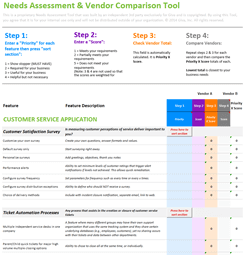5-Star Customer Service: Skills for Promoting Excellence in Every Interaction Plus Examples
Great customer service transcends basic needs — it transforms every interaction into a memorable and meaningful experience. Five-star customer service skills are essential for any business looking to stand out and retain customers in a competitive market.
These skills can be the difference maker, turning casual buyers into loyal patrons and building strong relationships along the way.

In this article, we'll explore the key skills that elevate customer service to exceptional levels.
What is 5-Star Customer Service?
Five-star customer service provides an experience that goes beyond good--it's exceptional in every way. It is the kind of service that anticipates the needs of customers before they even express them. This can include offering proactive and personalized solutions that make each customer feel valued.
Such a level of service involves not only responding to customer inquiries and issues quickly but doing so in a way that exceeds their expectations. From the first contact to the final resolution, every step is handled with utmost care and precision. This helps ensure that customers leave not just satisfied, but genuinely impressed. This is what sets businesses apart in crowded markets where consumers have seemingly endless choices.
Dive deeper: Providing exceptional customer service usually begins with understanding what your customers' top pain points are: Top 20 Customer Pain Points with Examples and Solutions
Watch Our Video on Mastering 5 Star Customer Service: Skills for Success
15 5-Star Customer Service Skills to Keep Your Customers Coming Back
Mastering these skills is essential for delivering the level of service that customers remember and appreciate. Here's a detailed look at 15 critical 5-Star customer service skills:
-
Active Listening
Fully engage with what customers say, understand their points, ask probing questions, and avoid interrupting.
-
Communication Skills
Convey information effectively and clearly, both verbally and in writing, ensuring customers feel heard and understood. Customers also like to have records of conversations and what you have promised. Ensure they can obtain this information easily, perhaps even without having to ask for it.
-
Problem-Solving
Identify issues quickly and accurately, analyze information skillfully, and develop solutions that effectively address customer needs. At the end of the day, this is why customers have reached out to you. Whether it be a technical issue or product availability, they are looking for an answer.
-
Empathy
Demonstrate genuine care and understanding for the feelings of others. Customers can often pick up on an agent who lacks empathy.
-
Patience
Maintain calmness and understanding in all customer interactions, especially when dealing with complaints or frustrations. It is always better to transfer the call to another agent for cooler heads and a different perspective, rather than becoming confrontational with the customer.
-
Adaptability
Adjust actions in response to changing situations or to meet the needs of different customers. Each one of your customers is different. Cookie-cutter replies do not promote customer satisfaction and can often come across as lazy. To the best of your ability, try to provide personalized service for all customers.
-
Product Knowledge
Have a thorough understanding of the business's products or services to confidently provide accurate information and support. This can often include technical knowledge as well. When your own agents cannot explain your products, it can lead to a major loss of trust between your business and your customers.
-
Time Management
Manage one's own time and the time of others effectively, ensuring prompt responses and follow-ups. Nobody likes to wait on hold for long, plain and simple.
-
Positive Attitude
Keep an optimistic and friendly demeanor at all times. Do not show cracks in confidence as this can be quite discouraging for those on the other end.
-
Teamwork
Collaborate with colleagues to provide seamless customer service and support. Read more: Customer Support Escalated Calls Fully Examined and Top 10 Strategies.
-
Resilience
Demonstrate the ability to recover from setbacks quickly and maintain professionalism under pressure. There is no playbook for how a customer may come at you. There will be many who enter the chat frustrated to begin with. There may be foul language, insults and more. Despite this, it is important to remember that the customer is mostly upset with the organization itself and the specific product or service. Customer service agents should do their best to not take anger personally.
Here are some tips:
- Use de-escalation tactics as necessary
- Be firm that you will not tolerate foul or aggressive language
- Know when it is time to transfer these types of calls to a manager or to disconnect entirely
-
Consistency
Deliver the same high quality of service in every interaction to maintain a reliable and trustworthy brand image. Customers should be able to predict the level of service they will receive from your organization.
-
Flexibility
Be flexible and adjust communication and problem-solving approaches based on the customer's preferences and situation. This can include a multitude of different scenarios, and agents should be able to quickly and calmly work through each situation with professionalism.
-
True Customer Care
Actively ensure that all customer issues are resolved to their satisfaction and gather feedback to improve future services. Sending a personal follow-up message or survey following an interaction can be a great way to evaluate the effectiveness of your customer service.
-
Empowered Responsibility
Make decisions that directly benefit customers while maintaining honesty about service limitations. And then, business owners and customer service managers - provide your staff with the ability to make their own judgment calls. Not everything needs to be drawn up like a playbook! Empowering your customer service agents promotes skill development and instills feelings of importance.
Examples of 5-Star Customer Service in Today's Market
To understand how the discussed skills and traits manifest in practice, let's explore some real-life 5-star customer service examples from well-known companies that set the gold standard in customer care:
- Amazon has streamlined the returns process, allowing customers to return certain items without the need for a printed label at designated drop-off points. Their customer service is accessible through multiple channels like phone, chat, and email 24/7, ensuring timely help.
- Zappos offers a 365-day return policy and has a customer service team available around the clock, which empowers them to address customer needs anytime. They are known for their "Deliver WOW Through Service" philosophy, which includes a 10-step core value system that promises its customers and associates things like positivity, fun, doing more with less and a continuous commitment to growth and learning.
- The Ritz-Carlton empowers each employee with a budget of up to $2,000 per incident, per day, to solve customer problems without needing managerial approval. Yes, you read that right. This policy is a testament to their commitment to personalizing guest experiences and resolving issues swiftly and effectively. When customers are spending what they do to stay at a Ritz Carlton property, it comes as no surprise that they are going to expect solutions that go above and beyond standard service levels.
- At Apple Stores, employees receive extensive training to handle not just technical issues but to also enrich the customer's overall shopping experience. This includes setting up new devices, offering personalized recommendations, and facilitating workshops and classes. For instance, the Genius Bar is the on-site technical resolution center, which is staffed with experts that can troubleshoot, repair or facilitate replacements with genuine Apple parts and service.
- Southwest Airlines offers a flexible cancellation policy where customers can cancel up to 10 minutes before flight departure without penalty. Even for its most basic fare category, Wanna Get Away, guests can receive a flight credit for future travel. This flexibility is crucial for customer satisfaction in the often-rigid airline industry.
- Chick-fil-A staff are trained to use positive language with customers, often responding with phrases like "my pleasure" instead of "you're welcome." This consistent polite interaction is part of their strategy to create a welcoming and friendly atmosphere.
- American Express differentiates its service by offering tailored benefits such as a concierge service for certain card types, like the Platinum Card. The concierge service can assist with a wide range of things like, but not limited to, arranging transportation, restaurant reservations, pet care and even sourcing special items like antiques and paintings.
- USAA provides insurance and financial services tailored specifically for military personnel and their families, offering lower rates and flexible payment schedules that take into account the unique circumstances of military life. Since their service is tailored towards a certain subset of the population, their members can bank on receiving personalized service for their unique situation.
- Costco's customer service includes a straightforward, no-questions-asked return policy and guarantees on products like electronics, which often extend beyond the manufacturer's warranty. They also provide additional services like travel planning and pharmacy services at competitive prices for certain cardholder tiers.
Benefits of 5-Star Customer Service
Implementing 5-Star Customer Service brings numerous advantages that can significantly elevate a business's success. Here are some key benefits:
-
Enhanced Customer Loyalty
Exceptional service not only encourages repeat business but also inspires customers to recommend your business to others. This loyalty is invaluable, as retained customers often contribute more to revenue over time compared to new customers. Ensure your company has loyalty incentives in place (ex. get 25% off after 3 purchases).
-
Increased Referrals
Satisfied customers are more likely to share their positive experiences with family and friends. This results in them being natural advocates for your brand. Word-of-mouth marketing is highly effective and cost-efficient.
-
Stronger Brand Reputation
Companies known for their outstanding customer service are also likely to enjoy a stronger brand reputation. Positive customer experiences often lead to favorable reviews and ratings online. This can attract new customers and convince those who may be on the fence.
-
Competitive Advantage
In a crowded marketplace, offering top-tier customer service can distinguish your business from competitors. It's a clear differentiator that can sway customers in your favor, even when other factors like price and product quality are equivalent.
-
Reduced Problems and Complaints
By proactively addressing potential issues and exceeding customer expectations, businesses can significantly reduce the frequency and impact of complaints and problems.
-
Employee Satisfaction
When a company is committed to providing excellent customer service, it often reflects a positive working environment that values employees. This can lead to higher employee satisfaction and lower turnover rates.
The Bottom Line: Harnessing 5-Star Customer Service Skills for Success
5-star customer service skills are not just a value-add; they are essential for businesses aiming to thrive in competitive markets. By prioritizing customer satisfaction and consistently delivering above and beyond expectations, organizations can build lasting relationships that translate into increased loyalty and business growth.
As we have seen in the examples above, there are a number of companies that are finding unique solutions to set themselves apart in a crowded market space. They are doing this through enhanced customer service options and flexibility.
Giva Can Help You Bring 5-Star Customer Service
To elevate your customer service delivery, consider integrating Giva's cloud-based Customer Service Software. With features like AI Copilot capability, a comprehensive Knowledge Base, and a Customer Self-Service Portal, Giva equips your team to exceed customer expectations consistently.
Our software also includes automation of tasks and ticket workflows, Tsunami Tickets™ for managing large-scale issues, and the flexibility of multiple service desk configurations.
Empower your team and take your customer service to new heights with the tools they need to provide 5-Star Customer Service every day. Request a demo of Giva's cloud-based customer service software, or start your free 30-day trial today.





